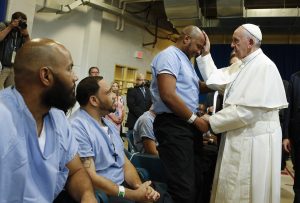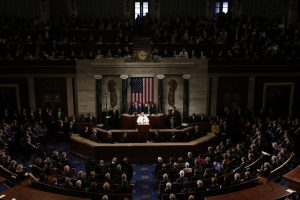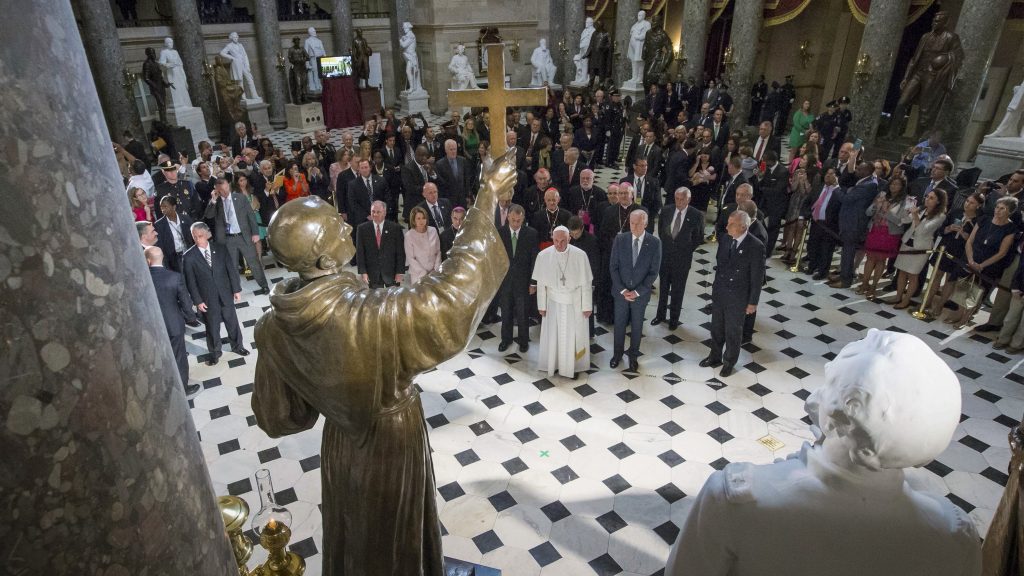Five years ago this month, Pope Francis embarked on his apostolic visit to the United States.
I look back with immense gratitude at the privilege I enjoyed as a communications professional serving the Church in the Washington, D.C., area, which allowed me to closely follow the Holy Father’s footsteps during his Sept. 22-27 visit.
It was both thrilling and exhausting (that man kept a packed schedule!) to accompany reporters to the canonization Mass for St. Junípero Serra, his address to Congress, and the closing of the World Meeting of Families.
I look back on those memories with wonder and gratitude that I could be so close to Peter, who came to bring Jesus to me.
Each major metropolitan city came to a standstill as crowds in the thousands flooded streets and plazas. I can’t think of a comparable experience I’ve had in the United States.
Who can forget the images of Pope Francis embracing persons with disabilities after his Masses, visiting Catholic schoolchildren and the incarcerated, greeting priests and religious, meeting elected officials, and kissing babies who were dressed like him?
It was a unifying moment for the Church and country. He lifted our gaze toward something higher and bigger than ourselves.
But I also look back with sorrow as I think about how much our country, Church, and world have changed in the mere five years since his visit: statues of St. Junípero are being torn down or removed throughout California; the nuncio who greeted Pope Francis on his visit called for his resignation in the wake of a new iteration of the sexual abuse crisis; and a pandemic swept across the globe, exacerbating the pain of the people and causes the pope has championed, including the poor and the hungry, the elderly, immigrants and refugees, and a planet in peril.
This is to say nothing of the polarization across the aisles — political and ecclesial — that has deepened with the widespread use of social media and targeted news and information-sharing.

In general, many people, including political and Church leaders, seem angrier, more anxious, and less interested in mercy and redemption than they were just a few short years ago.
Pope Francis’ 2015 visit shows how this disposition and the tactics that accompany it are inauthentic to the message of the Gospel and an ineffective means of spreading it.
In re-reading his speeches and homilies, it becomes clear that a divided America, one in which many people distrust their neighbors, does not have a bright or lasting future. On the other hand, if we can bridge the real or imagined gaps which polarize us, we have a shot at building up this “land of dreams.”
What did Pope Francis encourage us to do then which we might recommit to now?
In his canonization homily, the pope encouraged us to consider the mission that God has given to each of us. In the wake of the pandemic, which has wreaked havoc on so many people’s futures, this has become even more pressing: People have lost hope as well as a sense of meaning and purpose. They need a reason to go on, a means to provide for their families, and meaningful ways to contribute to the common good.
“Mission is never the fruit of a perfectly planned program or a well-organized manual,” Pope Francis preached. “Mission is always the fruit of a life which knows what it is to be found and healed, encountered and forgiven. Mission is born of a constant experience of God’s merciful anointing.”
His speech to Congress masterfully built on the idea of mission by reminding our legislators of their own: to “defend and preserve the dignity of your fellow citizens in the tireless and demanding pursuit of the common good.”
He had them consider why they should defend life in every stage of development and outlined what a just society looks like, from its care for immigrants to the abolition of the death penalty. He painted for them the picture of an America that embraced the principles of Catholic social teaching, one built on the firm foundation of the family and one which continues to strive to live up to its founding ideals.

He addressed how polarization and division cripples these efforts head-on:
“But there is another temptation which we must especially guard against: the simplistic reductionism which sees only good or evil; or, if you will, the righteous and sinners. The contemporary world, with its open wounds which affect so many of our brothers and sisters, demands that we confront every form of polarization which would divide it into these two camps.”
And he added:
“The challenges facing us today call for a renewal of that spirit of cooperation, which has accomplished so much good throughout the history of the United States. The complexity, the gravity, and the urgency of these challenges demand that we pool our resources and talents, and resolve to support one another, with respect for our differences and our convictions of conscience.”
I found that one of the most compelling parts of that speech was when he named four Americans whose faith inspired them to work for justice: Abraham Lincoln, Martin Luther King Jr., Dorothy Day, and Thomas Merton.
Their personal experience of God’s mercy moved them to create a society in which neighbors extended mercy to one another.
I think of their contributions, along with American saints like Serra, Father Solanus Casey, Mother Cabrini, Kateri Tekawitha, Elizabeth Ann Seton, and Katherine Drexel, as living out the vision summed up by Robert Kennedy to “make gentle the life of this world.” They embody the principles of faithful citizenship and can still inspire us today to do the same.
“Siempre adelante! Keep moving forward! For [Serra], this was the way to continue experiencing the joy of the Gospel, to keep his heart from growing numb, from being anesthetized,” Pope Francis proclaimed.
My anesthetized heart warmed up again by reliving Pope Francis’ visit five years ago. Maybe if more Americans remember his words and the graces of that trip, theirs will, too.

